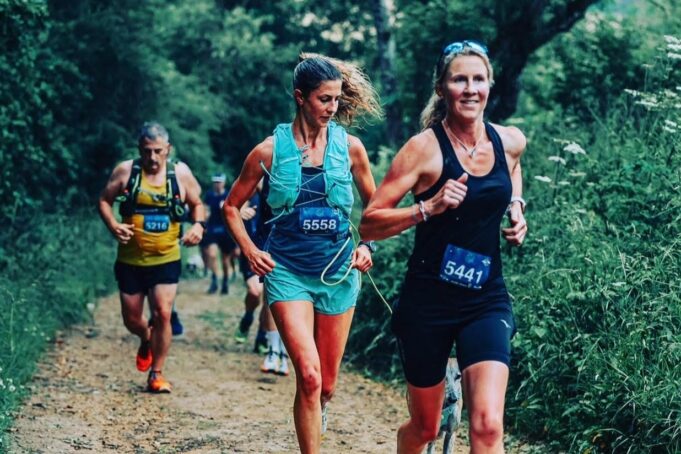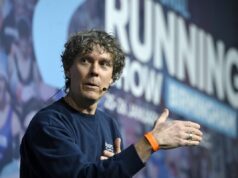In the latest UKRunChat podcast episode, we had the privilege of sitting down with mind and body coach Kim Ingleby. Kim shared her inspiring journey, from overcoming personal health challenges, to coaching individuals to unlock their full potential in running. Kim’s approach to training and life is rooted in the power of mindset.
Resilience: what it really means
One of the key themes of our conversation was resilience, a concept that often gets oversimplified as simply toughing it out.
Kim’s perspective on resilience is deeply personal. She shared her experience of dyslexia, dyspraxia, and ADHD, as well as opened up about her experience of brain injury and a vascular leak, all of which tested her both physically and mentally.
Kim shared a more nuanced perspective of resilience with us, emphasising that it is not a fixed trait, but a skill that can be cultivated over time. It’s a combination of mental flexibility, emotional regulation, and the willingness to step out of your comfort zone.
Building resilience as a runner
Kim offered practical ways runners can develop resilience:
- Embrace setbacks as natural seasons in life and use them as learning opportunities. Rather than viewing failures as the end of the road, see them as feedback.
- Focus on the process, not just the outcome: Celebrate the effort you put in, even if the result isn’t what you hoped for. This mindset helps build emotional resilience and keeps you motivated.
- Celebrate your wins to build resilience for the tough times.
Talking about how life and training naturally ebb and flow through good times and bad, Kim said: “You may have a season that is brilliant, but that will pass. And then another season will appear, and that’s really tough.”
“You might have a really hard ‘winter’ where you don’t have enough time to do your stretching, your core work, your rehab … your kids might be ill if you’ve got children. You might be caring for elderly parents. You might be changing jobs”.
“If your scale of stress is already quite high, that means your quality of training is potentially going to be impacted, or your need for a higher level of rest and recovery is higher”.
Kim advises to celebrate the times when things go well too: “There are moments in your life where everything flows. And I always say with people I’m coaching, share that too. Because that builds resilience for the hard times. I find that we find it hard to share our good times. But it’s really important, even if you just share it with yourself.”
Habits: your three non-negotiables
Kim explained how habits play a crucial role in building resilience. Small, consistent actions like setting 1 minute daily intentions, can create a solid foundation.
“Everyone has busy lives, but sometimes I just do a minute stretching, a minute of core, and make sure I get outside. Those three things are my non-negotiables”.
“It’s the discipline of having the habit that makes the change. Whereas if you’re like, ‘Oh, I’ve only got a minute, there’s no point’, then you have broken the habit. Whereas if you’ve done it for a minute, you’ve kept the habit going.
Beware when self-sabotage becomes a habit
Kim cautions us about self-sabotage: “It’s there to protect you, although that sounds weird, but it’s there because if you do that, then nobody else can get to you. And then it becomes familiar and it’s a habit. it’s really normal to go, ‘Oh, I’m not good enough’.”.
Getting out of the sabotage habit can be difficult, but it is possible: “The more you can understand yourself, the more you can help yourself”
“What is your default emotion? Is it anxiety? Is it stress? Is it anger? Is it frustration? Is it joy? Is it happiness? Is it burnout? Is it not being able to get off the sofa?”
Recognizing and breaking these patterns is a key part of the process.
“You have to keep telling yourself that [you ARE good enough] – once is never going to change it. Habits also take 21 days to change a habit, then it takes another 21 days to embed it as a new habit. So I always would say to people, you need to really be on it for up to three months.”
Rest looks different for everyone
Kim was keen to talk about the importance of rest of recovery, to keep us happy, healthy, and resilient.
Kim walks everyday, and says: I stretch every day too, for my quality of life. I spend time with friends and family, doing some of the community work that I do. I love music. Occasionally, like watching drama on TV, and going to different places, exploring things.”
Kim stresses that rest looks different for everybody however: “What does rest look like to you? And what nourishes you? What raises your nervous system and is good stress? And then what calms your nervous system?”
“People think rest is just sitting watching TV. Having like a nice bath. If that is nourishing for you, please do it. But some people don’t find that restful. There are lots of studies that show connection and community and friendship and laughter and eating together, and time in nature and music, and dance can all help our brain health and potentially reduce the risk of dementia and keep us connected and happy.”
“All these things also help if you get injured or ill, because then you’ve got some other areas in your life that can support you.”
Connect with Kim
Kim continues to inspire athletes and individuals worldwide through her coaching and fundraising efforts. You can follow her journey and find more of her advice on:
Instagram: @kimingleby
Website: www.energisedperformance.com
Listen to the Full Episode
For more insights from Kim, including her tips on overcoming self-sabotage, building resilience, and how she supports others to believe in themselves, tune into the full podcast episode here.
What does resilience mean to you? Let us know on social media @UKRunChat





